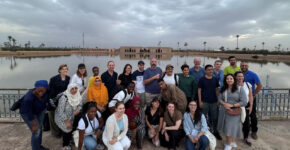
How can we transform our societies to live in harmony with nature?
Published on: April 24 , 2025
On Monday, April 7, 2025, a half-day session was held to present the findings of the IPBES assessment...

MIPS Conference No. 5 – Entropy at infinity in chaotic dynamics

Olivier Torrès: From PMU to PMist

An international platform for doctoral students engaged in water issues
Published on: April 11 , 2025
A space for collaboration on major water-related issues The key initiative...

Science at UM [S04-ep23]: Three years of thesis work summarized in three minutes
Published on: April 10 , 2025
This week in Science at UM, doctoral students Jérémy Defrance from the Ecology Center...

Chikungunya in Réunion: a widespread epidemic requiring heightened vigilance
Published on: April 4 , 2025
A significant chikungunya outbreak has been affecting Reunion Island since the beginning of 2025.

Mircea Sofonea, the model epidemiologist

ExposUM Doctoral Nexus: thesis topics for 2025 – applications closed
Published on: April 1 , 2025
What is the ExposUM Doctoral Nexus program? The Doctoral Nexus programs offered by...

Occitanie-East regional final of the "My Thesis in 180 Seconds" competition: Montpellier University in the spotlight
Published on: April 1 , 2025
On Friday, March 28, 2025, the Occitanie-Est regional final of the "My Thesis..." competition was held.

Scientific perspectives on contemporary art
Published on: March 31 , 2025
From February 15 to May 18 at MO.CO, the exhibition Experiencing the Unknown does...

Are consumers willing to eat products made from food waste?
Published on: March 31 , 2025
New entrepreneurial ventures are emerging to turn edible waste into...

Doctoral Degree Award Ceremony – Class of 2024 from the UM Doctoral College

We inherit our parents' genetics, but what about epigenetics?
Published on: March 31 , 2025
Epigenetic marks are chemical modifications to DNA that enable...

Science at UM [S04-ep22]: The migration routes of seabirds
Published on: March 27 , 2025
This week in Science at UM, Marie-Morgane Rouyer, a doctoral student at Cefe, reveals the...

Risks of conflicts between fishing and carbon sequestration in the ocean
Published on: March 26 , 2025
An international team led by researchers from the University of...
